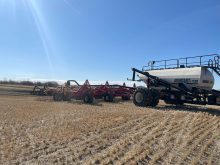Don’t expect higher canola prices any time soon, unless bad weather affects production later this year, according to two market analysts who spoke at Ag Days Jan. 21.
“Is the party over for canola? I’m sorry, it is for a while,” said Larry Weber of Weber Commodities in Saskatoon. “We’re going to need a drought in the United States or South America.
“The difference between now and the last four years — now when you see profit you’re going to have to take it.”
Read Also

Critical growing season is ahead for soybeans
What the weather turns out to be in the United States is going to have a significant impact on Canadian producers’ prices
A record 18-million-tonne canola crop in Western Canada, combined with a backlog in all grain shipments to export terminals, has reduced futures prices and widened the basis, bringing cash prices for canola to under $8 a bushel in some places, Weber said.
Canola futures prices alone have plunged almost 30 per cent with March futures closing Jan. 24 at $431 a tonne ($9.77 a bushel).
“If you want to look for some basis strength just don’t set your sights too high because it’s probably impossible that we get better than $20 or $30 (a tonne) under (the futures price),” said Brenda Tjaden Lepp, chief analyst at FarmLink Marketing Solutions.
“I think we’re going to be just simply in a very weak basis environment for quite a while until the supply situation sorts itself out.
“I kind of think it will be in 2015-16 that the canola market, and oilseeds in general, will be able to work their way back up.”
Tjaden Lepp estimates a 3.6-million-tonne canola carry-over when the 2013-14 crop year ends July 31, versus just 700,000 tonnes in 2013.
She says the supply/demand forecast is similar to 2009-10 when canola futures averaged $340 a tonne ($8.61 a bushel).
“That’s kind of where I think it’s going,” Tjaden Lepp said. “And it’s going to stay there until something changes to help alleviate the supply situation — the very unique, made-in-Western-Canada, oversupply situation.”
Weber said that in more than 30 years, he has never seen wider basis levels for canola. In some cases it’s just grain buyer greed, he said.
Both Tjaden Lepp and Weber, who spoke separately, marvelled at this year’s record production and how quickly canola prices fell.
“It’s really mind blowing,” Tjaden Lepp said.
Doing nothing didn’t work
Still, farmers could have locked in profitable prices between September and the beginning of November, Weber noted.
“The last four years doing nothing (about locking in prices) was the right option,” he said. “That’s not going to be the same going forward.”
Tjaden Lepp had a similar message. Farmers need to plan grain marketing well in advance. It starts by gathering information and then forming an opinion about what the market might do.
Vancouver terminals are already booked for deliveries until June or July, she said. Meanwhile, Japanese customers are buying canola for October-November delivery. That could prevent farmers from being able to sell canola off the combine this fall. Locking in a poor basis now for fall delivery might be better than not being able to deliver at all in the fall, Tjaden Lepp said.
From the Grainews website: Rail congestion stymies Man. company’s U.S. crusher
“It (the canola basis) has just ballooned and it’s really all the market can do in order to discourage demand on the West Coast and discourage new selling in the country,” she said.
Futures prices might rally, but grain companies will likely widen their basis to limit any gains in cash prices.
Tjaden Lepp said one elevator in northeast Alberta had essentially stopped buying grain because it was fully booked. But when it received more cars than expected, it offered a special — $9-a-bushel canola.
“It lasted an hour and a half,” she said. “This was a month ago. When that happens there is no need for the basis to go up.”
Everything changed Aug. 1, 2012 when the Canadian Wheat Board’s sales monopoly ended, Weber said.
“It’s not just about prices, it’s about delivery slots,” he said. “And if you think this transportation mess isn’t going to affect canola, you’re wrong.”
According to Tjaden Lepp grain companies are focusing on moving wheat now because the margins are better than for canola.
Farmers should shop around before selling their grain.
“The fact remains there is $1 to $2 a bushel between buyers in any given community on any given day,” she said. “Right now the canola basis varies from $35 (a tonne) under (the canola futures) to $85 under from one company to the next across Western Canada.
“And you have to negotiate as well, (but) farmers aren’t in a negotiating position right now.”




















